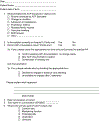The design and conduct of a pragmatic cluster randomized trial of an advance care planning program for nursing home residents with dementia
- PMID: 35815777
- PMCID: PMC9691516
- DOI: 10.1177/17407745221108992
The design and conduct of a pragmatic cluster randomized trial of an advance care planning program for nursing home residents with dementia
Abstract
Background/aims: A significant number of people with Alzheimer's disease or related dementia diagnoses will be cared for in nursing homes near the end of life. Advance care planning (ACP), the process of eliciting and documenting patient-centered preferences for care, is considered essential to providing high quality care for this population. Nursing homes are currently required by regulations to offer ACP to residents and families, but no training requirements exist for nursing home staff, and approaches to fulfilling this regulatory and ethical responsibility vary. As a result, residents may receive care inconsistent with their goals, such as unwanted hospitalizations. Pragmatic trials offer a way to develop and test ACP in real-world settings to increase the likelihood of adoption of sustainable best practices.
Methods: The "Aligning Patient Preferences-a Role Offering Alzheimer's patients, Caregivers, and Healthcare Providers Education and Support (APPROACHES)" project is designed to pragmatically test and evaluate a staff-led program in 137 nursing homes (68 = intervention, 69 = control) owned by two nursing home corporations. Existing nursing home staff receive standardized training and implement the ACP Specialist program under the supervision of a corporate lead. The primary trial outcome is the annual rate of hospital transfers (admissions and emergency department visits). Consistent with the spirit of a pragmatic trial, study outcomes rely on data already collected for quality improvement, clinical, or billing purposes. Configurational analysis will also be performed to identify conditions associated with implementation.
Results: Partnerships with large corporate companies enable the APPROACHES trial to rely on corporate infrastructure to roll out the intervention, with support for a corporate implementation lead who is charged with the initial introduction and ongoing support for nursing home-based ACP Specialists. These internal champions connect the project with other company priorities and use strategies familiar to nursing home leaders for the initiation of other programs. Standardized data collection across nursing homes also supports the conduct of pragmatic trials in this setting.
Discussion: Many interventions to improve care in nursing homes have failed to demonstrate an impact or, if successful, maintain an impact over time. Pragmatic trials, designed to test interventions in real-world contexts that are evaluated through existing data sources collected routinely as part of clinical care, are well suited for the nursing home environment. A robust program that increases access to ACP for nursing home residents has the potential to increase goal-concordant care and is expected to reduce hospital transfers. If successful, the ACP Specialist Program will be primed for rapid translation into nursing home practice to reduce unwanted, burdensome hospitalizations and improve the quality of care for residents with dementia.
Trial registration: ClinicalTrials.gov NCT03323502.
Keywords: Alzheimer’s disease; Nursing facility; decision-making; end-of-life care; palliative care.
Conflict of interest statement
Declaration of conflicting interests
The authors declare that there are no conflicts of interest.
Figures




Similar articles
-
Perspectives of Nursing Home Staff in Advance Care Planning Conversations: Experiences from the APPROACHES Project.J Am Med Dir Assoc. 2024 Nov;25(11):105265. doi: 10.1016/j.jamda.2024.105265. Epub 2024 Sep 14. J Am Med Dir Assoc. 2024. PMID: 39288899
-
PRagmatic trial Of Video Education in Nursing homes: The design and rationale for a pragmatic cluster randomized trial in the nursing home setting.Clin Trials. 2017 Apr;14(2):140-151. doi: 10.1177/1740774516685298. Epub 2017 Jan 9. Clin Trials. 2017. PMID: 28068789 Free PMC article. Clinical Trial.
-
Advance Care Planning Video Intervention Among Long-Stay Nursing Home Residents: A Pragmatic Cluster Randomized Clinical Trial.JAMA Intern Med. 2020 Aug 1;180(8):1070-1078. doi: 10.1001/jamainternmed.2020.2366. JAMA Intern Med. 2020. PMID: 32628258 Free PMC article. Clinical Trial.
-
The effects of advance care planning intervention on nursing home residents: A systematic review and meta-analysis of randomised controlled trials.Int J Nurs Stud. 2022 Aug;132:104276. doi: 10.1016/j.ijnurstu.2022.104276. Epub 2022 Apr 30. Int J Nurs Stud. 2022. PMID: 35667145
-
Process of Advance Care Planning in Nursing Home Settings: An Integrative Literature Review.Res Gerontol Nurs. 2022 Nov-Dec;15(6):312-320. doi: 10.3928/19404921-20220930-04. Epub 2022 Oct 10. Res Gerontol Nurs. 2022. PMID: 36214735 Review.
Cited by
-
Design Considerations for Embedded Pragmatic Clinical Trials of Advance Care Planning Interventions for Persons Living With Dementia.J Pain Symptom Manage. 2023 Feb;65(2):e155-e163. doi: 10.1016/j.jpainsymman.2022.11.009. Epub 2022 Nov 21. J Pain Symptom Manage. 2023. PMID: 36423803 Free PMC article. Review.
-
Perspectives of Nursing Home Staff in Advance Care Planning Conversations: Experiences from the APPROACHES Project.J Am Med Dir Assoc. 2024 Nov;25(11):105265. doi: 10.1016/j.jamda.2024.105265. Epub 2024 Sep 14. J Am Med Dir Assoc. 2024. PMID: 39288899
References
-
- Centers for Disease Control. Alzheimer’s Disease Atlanta, GA: U.S. Department of Health & Human Services; 2016. [Available from: https://www.cdc.gov/nchs/fastats/alzheimers.htm.
-
- Mitchell SL, Teno JM, Miller SC, et al. A national study of the location of death for older persons with dementia. J Am Geriatr Soc 2005;53(2):299–305. - PubMed
Publication types
MeSH terms
Associated data
Grants and funding
LinkOut - more resources
Full Text Sources
Medical
Research Materials

